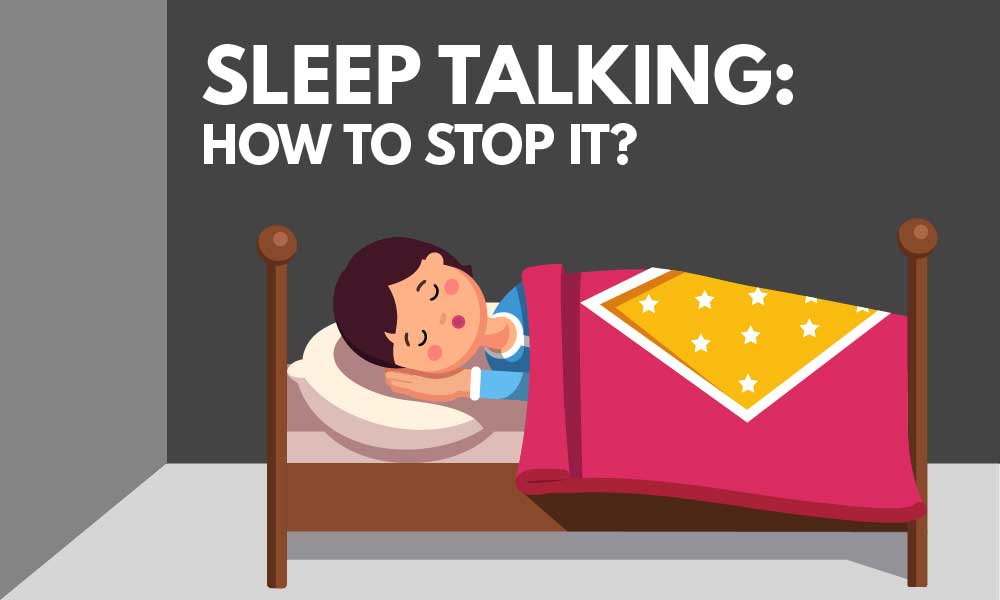
Understanding Sleep Talking and Ways to Stop It !
03-06-2019 | Posted By: Shagun Parasher | 5969 View(s)
Have you been in a situation when your spouse told you that you were talking in your sleep? Are you scared that your sleep talking habit is going to reveal your secrets? And the weirdest thing about sleep talking is that you don’t remember a word you said during the sleep. It is often funny for others to witness this situation. Read on to find about the solutions to all your questions regarding sleep talking, Its causes and treatment.
What is Sleep Talking?
Sleep talking, also known as Somniloquy, is a sleep disorder defined as talking during sleep unaware. It includes speaking complicated dialogues or monologues or mumbling. The words could be very clear or hard to decipher, can consist of simple sounds, long and short speeches which occur for not more than 30 seconds per episode. It is a common occurrence and not harmful usually. Anyone can experience sleep talking, but it is common in males and children. It could be spontaneous or induced by a conversation with the sleeper.

Causes of Sleep Talking
If you think that sleep talking occurs during dreaming, but it has not yet been proved as to what causes sleep talking. Sleep talking could be an indicator of sleeping disorders or health condition. REM Sleep behaviour disorder (RBD) and sleep terrors are two types of sleep disorders that can cause some people to talk or even shout while sleeping. People with RBD yell, grunt, shout and grunt while people who get sleep terrors thud, kick, cry and scream.
Sleep talking runs in families but is majorly due to external factors. It can occur along with sleepwalking and nocturnal sleep-related eating disorders. Certain other things that can cause sleep talking are;
1. Excessive medications
2. Emotional stress
3. Mental health disorder
4. Substance abuse
5. Day-time drowsiness,
6. Sleep deprivation.
7. Depression
Stages and Severity
Sleep talking is defined under both gravity and stages.
Stages
• Stage 1 and 2- These stages include the person not being in as deep of sleep as stages 3 and 4. What they speak is easy to understand.
• Stage 3 and 4- The sleep talker is in a deep sleep, and their sleep is hard to understand.
Severity
• Mild- Happens less than once a month
• Moderate- Occurs once a week but not every night. It doesn’t interfere much with the sleep of other people in the room, say your spouse or parents.
• Severe- Sleep talking is an everyday story now and can likely cause interference with other’s sleep.
Treatment
You should see a specialist if your sleep talking is accompanied by physical fear, nightmares, sweating, RBD and night terrors. You might also run to the doctor if it is interfering with your sleep and that of your roomies. Even if this habit of yours is not because of any disorder, your doctor may diagnose an underlying issue such as substance abuse or stress.
Sleep talking rarely requires treatment. Severe sleep talking may be the result of another more serious sleep disorder or medical condition which can be treated.
Your doctor might suggest the following measures;
• Following a regular sleep schedule- Sleeping on time and waking up on time can help curb your sleep talking to a higher level.
• Refrain as much as from alcohol, caffeinated drinks such as coffee, tea, cola etc.
• Refrain from eating heavy meals
• And don’t take the stress
• Cut some medicines or reduce the dose if you can do without them
• Practise proper sleep hygiene
• Keep a sleep diary with you to identify your sleep patterns and may help your specialist to find out if you are suffering from a severe problem or not.
• Prefer a DIY approach. Keep your smartphone by your side with a snoring app installed that records noises during sleep. Such apps help record snoring, sleep talking along with the time they occur and also recording them.
These were some ways by which you can reduce sleep talking and help your doctor diagnose if the condition is severe or not. We hope you like this article, if you do, share it with your friends and family.


